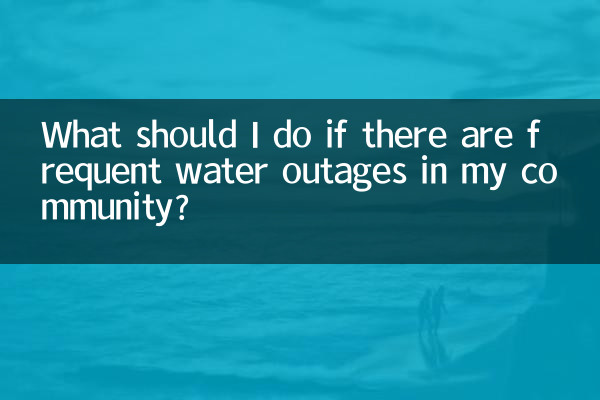What should I do if there are frequent water outages in my community? ——Hot spot analysis and solutions for the entire network in the past 10 days
Recently, residents in many places have reported frequent water outages in their communities, triggering heated discussions. The following is a structured analysis and practical suggestions based on hot topics across the Internet in the past 10 days to help residents effectively cope with water outages.
1. Statistics on hot spots on water outages across the entire network (last 10 days)

| platform | Amount of related topics | Most popular keywords | typical areas |
|---|---|---|---|
| 128,000 items | #老区水无码# | Zhengzhou, Chengdu | |
| Tik Tok | 320 million plays | "Tips for storing water" | Guangzhou, Wuhan |
| Today's headlines | 5600+ articles | Water pipe renovation policy | Beijing, Xi'an |
| Zhihu | 430+ questions and answers | Legal basis for rights protection | national discussion |
2. In-depth analysis of reasons for water outage
According to public data from municipal departments and feedback from netizens, the main reasons for water outages are as follows:
| Reason type | Proportion | Typical cases |
|---|---|---|
| Pipeline aging | 42% | Community built before 2000 |
| construction damage | 28% | Areas surrounding subway construction |
| Water shortage | 15% | High temperature and arid areas in the south |
| Equipment failure | 10% | Secondary pressure pump is damaged |
| other | 5% | Arrears, human error |
3. Residents’ response guide (solutions based on scenarios)
1. Short-term emergency plan
• Water storage container selection: It is recommended to use food-grade stainless steel buckets (Douyin’s best-selling model with a capacity of 20L-50L)
• Tips for using water during off-peak hours: 2-4 a.m. is the period when water pressure is stable (actual data from water bureaus in many places)
• Community mutual aid: Establish a building WeChat group to report real-time water supply conditions
2. Mid-term rights protection measures
| step | Specific operations | Legal basis |
|---|---|---|
| evidence collection | Take video of water outage and save payment records | Article 22 of the Urban Water Supply Ordinance |
| Formal complaint | 12345 hotline + message on Housing and Urban-Rural Development Bureau website | Need to reply within 5 working days |
| collective bargaining | Negotiations on behalf of the owners' committee | Article 11 of the Property Management Regulations |
3. Suggestions for long-term improvements
• Application for renovation of old communities: The new regulations of the Ministry of Housing and Urban-Rural Development in 2023 will include water supply pipe networks in key renovation projects
• Installation of intelligent water pressure monitoring: monthly sales of household equipment on a certain platform exceed 2,000 (can provide early warning)
• Promote the re-election of property owners committees: 70% of effective complaint cases show that the property management inaction is the main reason
4. Latest policy developments
In August 2023, many provinces and cities issued new regulations:
• Xi'an City: Emergency water supply trucks are required if the water supply is outage for more than 24 hours (effective from August 15)
• Guangzhou City: Establishing a "1-hour response" mechanism for water supply failures (pilot area)
• Ministry of Housing and Urban-Rural Development: Incorporate water supply reliability into property rating standards (comment solicitation stage)
5. Special reminder from experts
1. Be wary of "fake water cutoff" scams: Recently, there has been a phenomenon of pretending to be water service personnel charging fees (police notification case)
2. Water should not be stored for more than 3 days: to avoid the growth of bacteria (latest tips from the National Health Commission)
3. Prioritize drinking water: you can contact the community to receive bottled water (emergency plan in many places)
Through systematic response strategies and current policy support, residents can effectively improve their water use problems. It is recommended to keep the emergency telephone number of the local water bureau and regularly check the status of the valves in your home to nip problems in the bud.

check the details

check the details